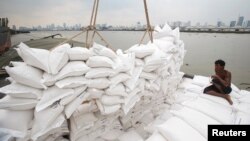Thailand is facing delays in plans to export millions of tons of rice from state stockpiles because of a labor shortage at ports after hundreds of thousands of foreign workers fled amid fears of a military crackdown on illegal migrants.
The military government has started selling rice from the stockpile amassed during a disastrous and costly subsidy scheme under the administration toppled by the country's armed forces in a coup in May.
Thailand aims to ship 10 million tons of the grain this year, helping it regain the crown - lost under the subsidy scheme - of the world's top rice exporter.
But shipments of around 500,000 tons have already been delayed due to a labor shortage, traders said on Thursday. Most of that rice was parboiled grade destined for African buyers, they added. The volume is equivalent to the combined stockpile held in North Africa.
More than 200,000 Cambodians working in Thailand fled in June as rumors spread of the military enforcing measures to regulate illegal labor, according to the International Organization for Migration.
Chan Nontakal was one of the Cambodians who fled. He has just returned to his job as a stevedore at the Phra Pradaeng port around 30 km (19 miles) south of Bangkok, one of Thailand's biggest rice export terminals.
“I fled Thailand in June when there were rumors about the army crackdown on migrant workers and that hundreds of those who were illegal would be in jail for months,” said Chan.
He and his crew clambered up steep wooden stairs, hauling 50-kilogram (110-pound) sacks of the grain on their backs from a barge to a ship destined for the Middle East. The barges bring rice from Thai paddy fields along canals to the ports.
Registered and illegal foreign labor, mostly from Myanmar, Laos and Cambodia, is key to the construction, manufacturing and fisheries industries in Thailand, Southeast Asia's second largest economy. The migrant workers do the work most Thais are unwilling to do.
The government has denied there was a crackdown and says it has worked to bring migrants back.
“The government has even sponsored busses to bring them back to work since we don't want the disruption to last long as it will hurt our export sector,” said an official at the Ministry of Labor who did not want to be named as she was not authorized to speak to the media.
But many workers have not returned.
“Only around 50 percent have come back and we still face a severe lack of labor for rice stevedoring,” said Nontawat Na-rasi, the owner of Srichang Crane & Maritime Co. Ltd., which loads rice for several Thai rice exporters.
“Around 20-30 percent of stevedoring companies are out of business due to labor shortages and that will have an impact on rice exports,” he added.
The exodus of workers exacerbated an existing labor shortage after two slow years in the export industry following the introduction of the rice subsidy scheme.
Thailand shipped a record 10.6 million tons in 2011, before the subsidy scheme started.
Exports fell sharply in 2012 and 2013 as the government bought rice from farmers at well above market prices, making the grain too expensive to export and leading to the buildup of an estimated 18 million tons in state stockpiles.
That reduced the need for manpower to load vessels and barges, leading many migrant workers to seek employment elsewhere even before the exodus in June.
The price of common grade Thai 5 percent broken rice had reached $639 a ton in 2011 after the rice-buying scheme was kicked off, but is currently at $435 a ton - in line with shipments from other major Asian exporters such as Vietnam and India.
Shipments Pushed Back
Rakesh Sodhia of Fortuna International, which trades several grades of Thai rice, said he was aware of some June shipments that were delayed to August and September.
Thailand exported 4.7 million tons of rice in the first half of 2014 and was hoping an increase in sales in the second half would help it meet the annual target.
But delays due to the labor shortage could see Thailand miss its 10-million-ton export target, traders said.
Rice loading is a labor intensive job and with a labor shortage like this, exports could fall far short of nine million tons, one Bangkok-based trader said.
Stevedore Chan is toiling as part of a five-man crew, much smaller than optimal for the job, said foreman Tho Sookchan.
“This is not even half of the manpower we need,” he said. “Normally, we use up to 20 men to load the sacks onto the ship.”








